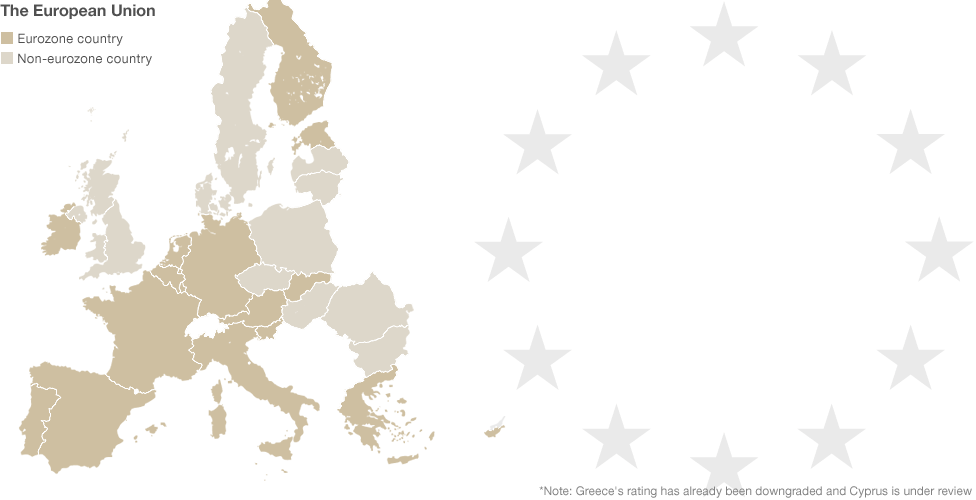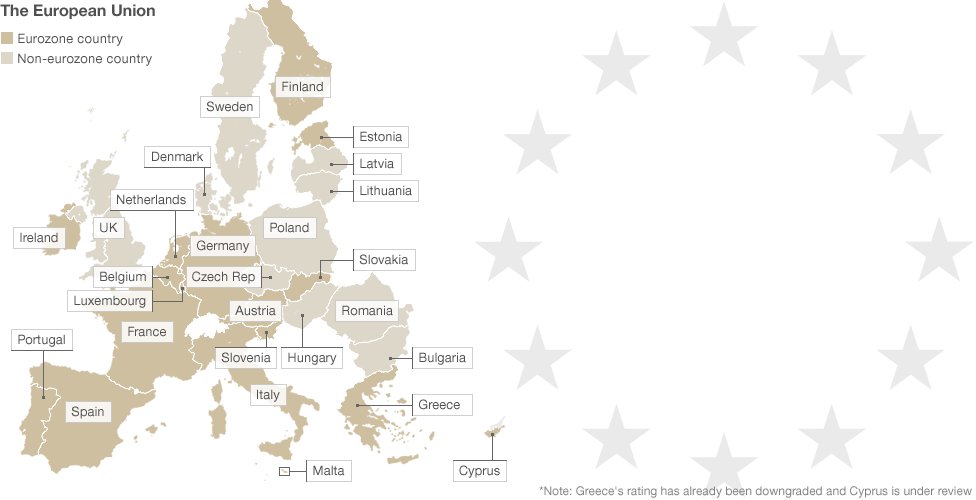The euro: Where they stand |
||
|---|---|---|
| The groups | Who they are | Where they stand |
|
The Drivers |
France and Germany |
Chancellor Angela Merkel and President Nicolas Sarkozy have been the driving force for stricter budget rules for the eurozone, including fines for rule-breakers. But their stance has aroused some dissent. Germany has angered Greece by demanding greater EU monitoring of its finances and is resisting pressure from other EU members to increase the size of the permanent bailout fund, the European Stability Mechanism (ESM). France is now in a weaker position as it has lost its AAA credit rating from Standard and Poor's. |
|
The other eurozone members |
Netherlands, Finland, Luxembourg, Austria, Belgium, Estonia, Cyprus, Malta, Slovakia, Slovenia, Portugal, Italy, Ireland, Spain and Greece |
Like Germany, the Netherlands, Finland and Luxembourg still hold AAA ratings. But Finnish Foreign Minister Erkki Tuomioja says the new rules - set out in the EU fiscal treaty - are more about "Germany's domestic policy needs". Luxembourg Foreign Minister Jean Asselborn is said to consider the new treaty a "waste of time". In common with France, Austria has seen its AAA rating downgraded and backs a stronger bailout firewall. Italian PM Mario Monti is critical of Germany's focus on deficits, arguing that growth is essential to cut debt. Greece, Ireland and Portugal have all received EU/IMF bailouts. Of all 27 EU states only Ireland may have to hold a referendum on the new fiscal treaty. Greece, desperate to avoid defaulting on its debts, has rejected German proposals for an EU commissioner to have veto powers over its budget. Athens' position is backed by Luxembourg and Austria. Slovakia has backed a call by three neighbouring non-eurozone states to be involved in eurozone summits. Cyprus, its banks heavily exposed to Greece, has seen its credit ratings fall, as has Slovenia. Spain's new centre-right Prime Minister Mariano Rajoy, struggling with five million unemployed, has vowed to cut Spain's deficit. |
|
Out of the zone - but keen to be in the deal |
Poland, Hungary, Czech Republic, Latvia, Lithuania, Romania, Bulgaria and Sweden |
All eight are obliged to join the euro, eventually, although most Swedes are opposed and the Czechs are in no rush. The main opposition to the treaty has come from Polish PM Donald Tusk, who complains it lacks ambition. Backed up by the Czechs and Hungary, he wants non-eurozone countries to take part in eurozone summits. Sweden will back the treaty if it does not have to cede decision-making power to Brussels over its budget. Latvia, recipient of a 2008 EU/IMF bailout, backs fiscal discipline, having already been through austerity. Lithuania avoided a bailout but shared Latvia's position. Romania wants to stay on course to join the euro in 2015; like Bulgaria, it is anxious to join the passport-free Schengen zone soon. |
|
Not joining the euro - but behind the treaty |
Denmark |
Like the UK, Denmark has an opt-out from the euro but is now holding the EU presidency and wants to be a bridge by achieving consensus. |
|
Out of the zone - and against the treaty |
UK |
The UK has opted out of the euro and, alone of the 27 EU members, has refused to back the fiscal treaty. But it has apparently dropped its initial threat to block the use of EU institutions such as the Court of Justice to implement the treaty. Now Foreign Secretary William Hague says a UK block would only happen if the treaty damaged or threatened British interests. |
30 January 2012
Last updated at 18:27


EU and the euro: Where they stand
Labels:


- 27 member states
- 17 countries adopted the euro - the eurozone
- 3 eurozone bailouts: Greece, Ireland, Portugal
- 2 countries have received informal bailouts: Italy and Spain
Features
-
IS in Europe: The race to the death
Tuesday's devastating attacks in Brussels show IS's European network is still at large, despite a year of intensive efforts by security forces to close it down.
-
Project Greenglow and the battle with gravity
Scientists are debating whether it's possible to harness the power of gravity for interstellar space travel.
-
The boy who refused to leave police custody
The four-year-old boy who has become the centre of a controversy between India and Pakistan - and between his father and mother.
-
The mirth and misogyny of Andy Capp
Why, almost 60 years after he first appeared in the Daily Mirror, is a layabout lout from north-east England still so loved around the world?
~RS~q~RS~~RS~z~RS~39~RS~)

 Co-pilot 'wanted to destroy plane'
Co-pilot 'wanted to destroy plane'